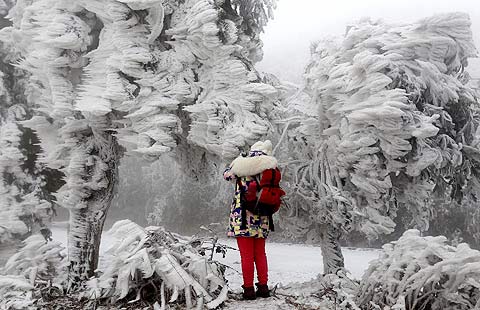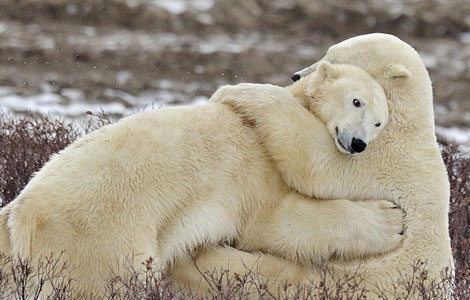Leadership style in the world's most extreme workplace
Updated: 2014-02-11 09:56
By Pauline Askin in Sydney (China Daily)
|
|||||||||||
|
Two Adelie penguins stand on a block of melting ice atop a rocky shoreline at Cape Denison, Commonwealth Bay, East Antarctica. Rachael Robertson's new book Leading on the Edge is about her 12-month expedition in Antarctica. Reuters |
At age 34, Rachael Robertson accepted the biggest challenge of her life: to lead a large, 12-month expedition in Antarctica. Two months on, she found herself having to ask the team of 120 how they managed to get through a year's supply of condoms in just eight weeks.
Robertson, a former chief ranger for the national parks service in Australia's Victoria state, talks about her book Leading on the Edge and how she developed a unique style of leadership using a technique called "no triangles".
Many people have written about their experiences in the frozen south - what's different about your story?
A. Mine is a leadership book, it's not a memoir. It's based on my journals. I've taken what I learned and applied it to any workplace anywhere in the world. Antarctica is traditionally a very "blokey"-almost a "command and control" and military - style where what happens on station stays on station. I'm going to take a corporate leadership mindset, like zero tolerance for bullying or harassing and coaching my people on how to communicate with each other.
Is leading a team in Antarctica any different from leading a team in the corporate world?

A. You've got to deal with it immediately and you've got to do it on your own. You can't have a meeting with human resources and talk about it for a few days. It's such a pressure-cooker environment, you can't ignore things. That's the main difference. That's where I implemented "no triangles" - a two-way system of confronting an issue respectfully. I think corporate life could learn from this. Respect is more important than harmony.
In one of the manuals you found instructions on how to cook a penguin. Were you ever tempted to cook one?
A. It's still in the current survival guidebook. No, I wasn't tempted to cook a penguin. We had the opposite problem as we had a fantastic chef. Weight gain is a big issue because you can't just go down to the shop and buy a bigger size.
What are some of your funnier memories?
A. We went through 2,000 condoms with 120 people in eight weeks. Falling pregnant down there is pretty drastic. My take on it is we had a lot of students there for the summer and they saw the opportunity to take a few back home to Australia. Having to stand up and talk to my staff about condoms was one of those surreal moments in my career. When I pointed out that we'd gone through an extraordinary supply of condoms - an entire year's supply - most were returned. It was only when I pointed out what ever we use over summer means we don't have any in winter.
You are faced with many dangers on a daily basis. What is one of the more unusual ones?
A. Fire. If a fire started and we lost our shelter, you are dead. Even a little fire is a real threat because you can't get water in winter, so whatever we get in summer has to last us. It takes a lot of diesel fuel to melt ice.
Did you ever feel you were intruding on nature?
A. Yes, there was a classic moment when the most beautiful penguin I had ever seen blocked my pathway. His feathers were silken and shiny and his colors shone in the low sun. I looked at him and said "Dude, you are in my way". I'm sure I heard him say "Dude, you're in my home, I was here first".
Related Stories
Tang Wei portrays female writer Xiao Hong 2014-01-23 13:48
Top Chinese writers release new books 2014-01-13 13:31
New children's book traces feather journey 2013-10-15 07:39
Writers chase their authorial dreams online 2013-10-10 10:14
Spanish writer's act of faith 2013-11-19 11:19
Today's Top News
Joint operation ensnares poachers
China's largest private charity elects new chiefs
Action needed to halt bird flu, experts warn
French president coming alone to White House
Geneva II talks resume over Syria
UN agency says Iran probe needs more work
Giraffe shot and dismembered in Copenhagen Zoo
Minimum alcohol price would save UK lives
Hot Topics
Lunar probe , China growth forecasts, Emission rules get tougher, China seen through 'colored lens', International board,
Editor's Picks

|

|

|

|

|

|






